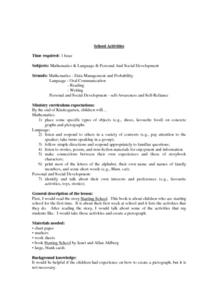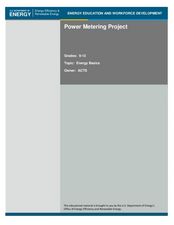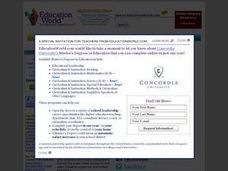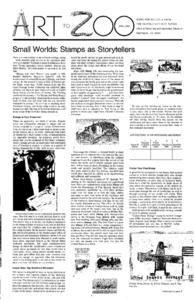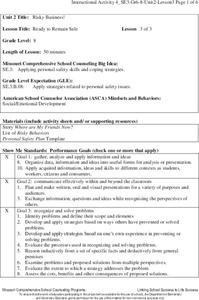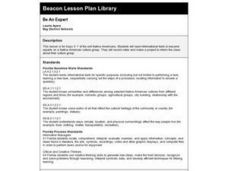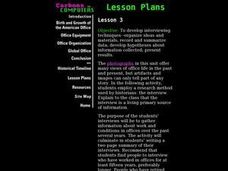Curated OER
Digger and the Gang
Help online friends Digger and Sprat from the BBC series to solve math problems! In a series of activities, your class will use data sets to calculate measurements, averages, means, and probabilities. The class completes worksheets and...
Curated OER
School Activities
First graders place some specific types of objects (e.g., shoes, favorite food) on concrete graphs and pictographs. They listen and respond to others in a variety of contexts (e.g., pay attention to the speaker; take turns speaking in a...
Curated OER
Numbers Tell a Story
Learners connect census data to historical events. In this civics lesson plan, students understand cause and effect, and how they are reflected in census data and analyze census data for social and economic significance.
Curated OER
Power Metering Project
High schoolers collect and analyze variable data and understand the concept of electrical power. In this energy lesson students use a spreadsheet to manage their data and create box plots.
Missouri Department of Elementary
The Successful Student: Let’s Review for Better Achievement
Study skills, time management skills, and test taking-skills are important attributes for both the classroom and the real world. Focus on these learning skills in a lesson that reviews how to be a good student and make better grades.
Curated OER
Working on the Slant
Compare and contrast a major news story from various newspapers. How does the perspective change? Are certain things included in some of the stories and left out of others? Have pupils complete a graphic organizer to compare how...
Curated OER
Yummy Math
Young mathematicians use bags of Skittles to help them gain practice in graphing and organizing data. They work in pairs, and after they have counted and organized their Skittles, they access a computer program which allows them to print...
Curated OER
Strawkets and Weight
Students investigate the effect that weight has on rocket flight. They construct a variety of straw-launched rockets that have different weights, observe what happens when the weight of a rocket is altered by reducing its physical size...
Curated OER
Farm Stories, Animal Webbing, Favorite Farm Animal Graph
Students brainstorm animals they would expect to see on a farm. They save these on a Kidspiration web. Students watch or read a farm story. They discuss the characters. Students vote for their favorite farm animal and crate a graph using...
Curated OER
Macbeth News Broadcast
Here is an authentic assessment task for Shakespeare's Macbeth. Young literature scholars prepare, perform, and record a news broadcast about the major events in the play. For example, groups may choose to report on the death of Lady...
Curated OER
Multiply Whole Numbers and Decimals
In this decimals activity, students analyze the data on a table and then read and solve 6 problems. Students read the story problems and multiply a decimal number by a whole number to solve.
Savvas Learning
Saxon Math 5/4
You'll never have to search for another worksheet again after downloading this extensive collection of Saxon math materials. With over 600 pages of example problems and skills practice exercises, this is a must-have resource for any...
Curated OER
Stamps and Cemeteries as Storytellers
Students discern the difference between commemorative and regular issue stamps while drawing conclusions about the time period. In this Stamps as Storytellers lesson, students design stamps using symbolism and historical data. In...
Cornell University
Fibers, Dyes, and the Environment
Nanofibers can be made through electrospinning or force spinning in order to reduce the negative impact on the environment. Pupils study the role of fibers and dye on the environment through a series of five hands-on activities. Then,...
Curated OER
Monkey for Sale
Second graders use play quarters to "purchase" items. They discuss how these are choices the character in the story they will read has to make. Students read the book "Monkey for Sale." They discuss the choices Luzolo makes and how she...
Curated OER
Let's Review for Better Achievement
Seventh graders create goals using two or more skills they have identified to help them improve academic achievement. They discuss the question: What choices do you make that affect your grades? Students listen to the story of Sam the...
Missouri Department of Elementary
Putting on Armor
Peers can exert tremendous pressure that can lead to positive and negative consequences. To conclude the Risky Business unit, class members create a Personal Safety Plan. They list things or situations that cause stress, things they have...
Curated OER
Solving Math Word Problems
Students use five word problem solving skills to solve a variety of math word problems. They observe the teacher modelling the five steps, and in small groups complete two worksheet word problems. Students read the problem, find the...
Curated OER
Be A Bug Scout
Students perform outside activities to determine the amount of insects, flowers, or common weeds within an area. They predict the number of insects they will find within their square area. Using calculators, students organize the data...
Curated OER
Be An Expert
Part of a series of lessons about bring Native American stories into the classroom, this plan suggests having kids research and take notes on one group of Native Americans and then complete a project that they present to the class. Pull...
Curated OER
Eco the Gecko and the Story of Economics
Second graders explore the basic concepts of economics through a puppet called Eco the Gecko.
Curated OER
Make Way for Ducklings
First graders use skills to collect, organize, and interpret data. They compare and contrast two stories, Make Way for Ducklings and Chibi: A True Story From Japan. Students create a duckling.
Curated OER
Creative Insects
Third graders examine insects that are common around the school. They write a creative story about being an insect for a day and include scientific data that they learned.
Curated OER
Carbons to Computers - 3
Students develop interviewing techniques--organize ideas and materials; record and summarize data; develop hypotheses about information collected; present results.



